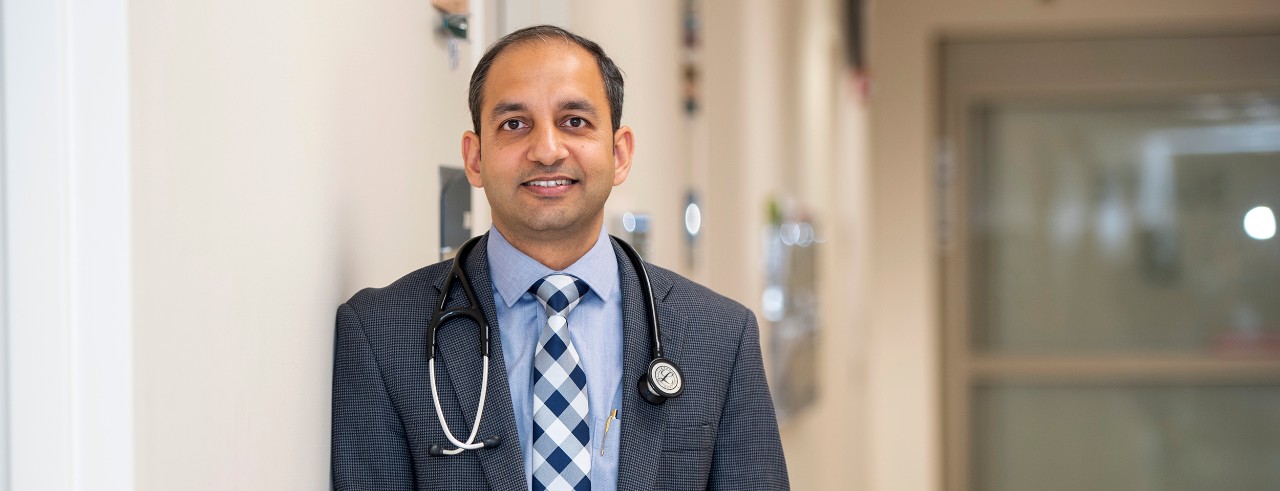
UC study shows promising results for cancer treatment
New results show chemotherapy prior to surgery may help outcomes for patients with pancreatic cancer
A clinical trial led by researchers from the University of Cincinnati has found that one-third of patients receiving chemotherapy before surgery for pancreatic cancer had very encouraging results at the time of the procedure.
The results of this National Cancer Institute’s SWOG Cancer Research Network trial will be presented as part of the ASCO20 Virtual Scientific Program, the online annual meeting of the American Society of Clinical Oncology (ASCO), which runs May 29-31.
Led by Davendra Sohal, MD, associate professor of medical oncology at UC and medical oncologist with UC Health, the SWOG trial compares two common chemotherapy regimens for early-stage pancreatic cancer and tests chemotherapy prior to pancreatic cancer surgery.
“Pancreatic cancer is the fourth most deadly cancer type in the U.S. That is because there are no symptoms in the early stages, making it difficult to detect, and because it spreads rapidly,” says Sohal. “There are few effective treatments, so survival rates are low, with only about 20% of pancreatic cancer patients living past one year after diagnosis. After five years, only about 7% are alive.”
He adds that when diagnosed, roughly 20% of pancreatic cancers are stage I or II, meaning they haven’t spread to other parts of the body and can be surgically removed. In this study, the research team wanted to test two chemotherapy regimens in patients with these early stage cancers, eligible for surgical removal.

Davendra Sohal, MD, led a trial showing that one-third of patients receiving chemotherapy before surgery for pancreatic cancer had very encouraging results. Photo/Colleen Kelley/UC Creative + Brand
Investigators enrolled 103 eligible pancreatic cancer patients between 2015 and 2018. Each patient was randomly assigned to receive either a chemotherapy agent mFOLFIRINOX, a combination of three chemotherapy drugs (fluorouracil, irinotecan, and oxaliplatin), or a different two-drug chemotherapy combination, both before and after surgery. Of the 103 patients, 77 completed chemotherapy and underwent surgery. Of those 77 patients, 73 had successful surgeries; afterward, 61 started chemotherapy and 48 completed chemotherapy.
Of patients who underwent surgery, 33% had a major or complete response to prior chemotherapy, meaning that there were either no signs of cancer in the tissue removed during surgery or minimal residual disease, regardless of what treatment patients received.
Also, 66% of patients completed post-surgery chemotherapy, which compares well with other studies in this field.
Sohal says these findings show that pancreatic cancer patients can undergo chemotherapy and go on to have a successful surgery without significant post-operative complications, but with 30% of patients enrolled and ultimately found ineligible, it’s still challenging for cancer physicians to evaluate good candidates for pancreatic cancer surgery.
“With 33% of patients getting a major or complete pathologic response, and 85% of patients with no cancer in tissue that is surgically removed, these results are very encouraging,” he says. “We also see from this study that giving chemo upfront, then performing surgery, may be the best treatment approach. For many patients, getting a second round of chemo after surgery is too debilitating.”
He adds that the team will get long-term study results soon.
“We will then know the number of patients still alive two years after their trial treatment and have better data on which of the two chemotherapy treatments performs best,” he says.
Next Lives Here
The University of Cincinnati is classified as a Research 1 institution by the Carnegie Commission and is ranked in the National Science Foundation's Top-35 public research universities. UC's graduate students and faculty investigate problems and innovate solutions with real-world impact. Next Lives Here.
The study was created, managed and funded by SWOG Cancer Research Network, a cancer clinical trials network that is part of the National Cancer Institute’s National Clinical Trials Network.
The study was funded by the National Institutes of Health through National Cancer Institute grant awards (CA180888, CA180819, CA180820, CA180821, CA189830, CA180801, CA189953, CA189957, CA239767, CA189821, CA189972, CA233230, CA189858, CA189958, CA189822, CA189848, CA189971, CA13612, CA189873, CA189856, CA180798, CA189861 and CA189954).
Featured image at top: Davendra Sohal, MD. Photo/Colleen Kelley/UC Creative + Brand
Related Stories
Before the medals: The science behind training for freezing mountain air
February 19, 2026
From freezing temperatures to thin mountain air, University of Cincinnati exercise physiologist Christopher Kotarsky, PhD, explained how cold and altitude impact Olympic performance in a recent WLWT-TV/Ch. 5 news report.
Discovery Amplified expands research, teaching support across A&S
February 19, 2026
The College of Arts & Sciences is investing in a bold new vision for research, teaching and creative activity through Discovery Amplified. This initiative was launched through the Dean’s Office in August 2024, and is expanding its role as a central hub for scholarly activity and research support within the Arts & Sciences (A&S) community. Designed to serve faculty, students, and staff, the initiative aims to strengthen research productivity, foster collaboration, and enhance teaching innovation. Discovery Amplified was created to help scholars define and pursue academic goals while increasing the reach and impact of A&S research and training programs locally and globally. The unit provides tailored guidance, connects collaborators, and supports strategic partnerships that promote innovation across disciplines.
Blood Cancer Healing Center realizes vision of comprehensive care
February 19, 2026
With the opening of research laboratories and the UC Osher Wellness Suite and Learning Kitchen, the University of Cincinnati Cancer Center’s Blood Cancer Healing Center has brought its full mission to life as a comprehensive blood cancer hub.
